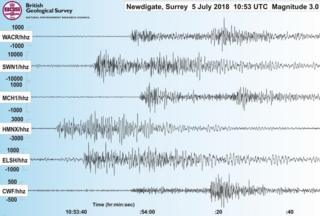 Image copyright
BGS
Image copyright
BGS
A seventh earthquake in just over 12 weeks has struck in Surrey in what has been described as a "swarm" of tremors.
The quake, measuring 3.1 on the Richter scale, struck at Newdigate, near Gatwick Airport, just before 12:00 BST.
It was the third tremor in nine days and the fourth reported to the British Geological Survey (BGS) since 1 April, but seismologist David Galloway said there had been a total of seven.
The BGS believes evidence points towards a natural cause.
More than 100 people have reported the latest quake to the BGS.
Robin Miller, in Newdigate, said: "The whole place shook. It felt like someone had reversed a vehicle into the building."
The tremor was also felt in Charlwood, Dorking, Reigate and Redhill.
Surrey's earthquake swarm
- Three tremors were felt on 1 April. The first had a magnitude of 2.7, a second within minutes came in at 1.8 and the third, an hour later, measured 1.7
- The fourth quake on 28 April measured 1.5
- The fifth on 27 June measured 2.6
- A sixth tremor on 29 June registered 2.4
- The latest and biggest quake on 5 July measured 3.0
"With this cluster or swarm, at the moment we put it down to natural seismicity. We live on a dynamic planet," Mr Galloway said.
"Plates move about all the time. They're bashing and moving away from each other."
He said the UK was not on the edge of a plate so did not get hit by huge quakes, but stresses could still affect the rocks.
Concerns had been raised that test drilling at Horse Hill by energy firm UKOG had caused the tremors, but Mr Galloway said the Oil and Gas Authority (OGA) had told the BGS no test drilling had taken place.
The BGS said the calculated epicentres for the earthquakes were about 4.5km (2.7 miles) from the Horse Hill well and scientists took the step of contacting OGA on 28 June.
An OGA spokesman said: "No flow testing operations are currently taking place at the Horse Hill drilling site."
'Worrying'
Friends of the Earth has called for an investigation.
Spokeswoman Brenda Pollack said: "We know that residents have concerns about the unusual number of earth tremors being felt in Surrey recently.
"And worryingly, it seems that the authorities can't yet say what has caused these.
"It's right that a thorough investigation now happens so that people know whether or not it is related to local oil activities."
'Deep-seated fault'
UKOG's executive chairman, Stephen Sanderson, said there had been no subsurface activity at Horse Hill since March 2016.
He said: "We are currently preparing to conduct a flow test using a crane. No flow has yet taken place. We are not drilling and operations utilise a crane not a drill rig.
"We should stress that the work we are planning has the same seismic impact as any type of construction work requiring the use of such a crane."
Mr Sanderson added: "We would also like to point out that there was no recorded seismicity associated with our 2014 drilling and 2016 flow testing, nor are we aware that any of the other 80 plus wells drilled or flowed in the Weald are associated with any seismicity.
"Furthermore as the BGS have stated, the source of this seismicity is related to a deep-seated basement fault at around 5.5km below surface, 4.5km deeper than our activities at Horse Hill."